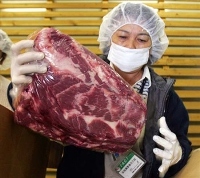First shipment of American beef arrives in South Korea
The first shipment of American beef in more than four months arrived in South Korea after Seoul agreed to take a softer stance in its tough anti-mad cow disease regulations.

Three earlier shipments of American beef were rejected by South Korea late last year for failing import regulations.
American beef, banned by Seoul after mad cow disease was discovered in the U.S. in December 2003, has been absent from South Korean markets for more than three years.
South Korea agreed last year to resume imports of U.S. beef, but only of boneless meat from cattle younger than 30 months old because of concerns that the brain-wasting disease is more likely to be present in bones and in older animals.
But efforts to resume imports ran into trouble in November and December, when South Korean inspectors found bone fragments in the first three shipments.
The 6.4-metric ton (14,100-pound) container that arrived Monday was shipped by Creekstone Farms Premium Beef of Arkansas City, Kansas. Creekstone had made one of the shipments last year.
Kevin Pentz, the meat packer's senior vice president, said Friday that the latest shipment underwent an extra round of inspections before leaving the United States.
South Korean inspections of the shipment, including X-rays, are expected to take seven to 10 days, Min Park of the U.S. Meat Export Federation's office in Seoul said.
Park said Monday's shipment is small and the importer is likely to use it to convince potential customers that the problems have been solved, suggesting it could still be some time before U.S. beef returns to South Korean restaurants and supermarkets.
According to the federation, the U.S. exported US$813.2 million of beef in 2003 before the ban went into effect, for a market share of about 68 percent. At the time South Korea was the third-largest market for U.S. beef, after Japan and Mexico.
Mad cow disease, formally known as bovine spongiform encephalopathy, is believed to spread when farmers feed cattle recycled meat and bones from infected animals. It is linked to the rare but fatal variant Creutzfeldt-Jakob disease found in humans.
After the shipments were rejected last year, the U.S. insisted American beef is safe and pressured South Korea to adjust its quarantine standards. South Korea said it would continue to ban U.S. beef containing bone fragments, but agreed to only reject those boxes containing problem beef, rather than the entire shipment as before.
Members of the U.S. Congress from beef-producing states have threatened to scuttle a free trade agreement reached earlier this month between the two countries unless the U.S. regains full access to the South Korean market.
Subscribe to Pravda.Ru Telegram channel, Facebook, RSS!


